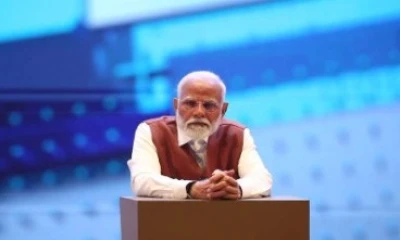In a resolute declaration, Prime Minister Narendra Modi asserted his firm belief in a divine mandate propelling him to tirelessly serve the nation until 2047, aiming to realise the vision of a Viksit Bharat (Developed India).
Speaking with unwavering conviction during the ‘Salaam India’ show with Rajat Sharma, PM Modi expressed, “I am convinced that it is my divine calling to tirelessly serve until 2047 to realize the vision of a Developed India.”
Modi attributed his confidence to a higher purpose, stating, “I firmly believe that the Almighty has entrusted me with a special mission to lead India towards prosperity by 2047. With divine guidance and boundless energy, I am confident of achieving this goal.”
PM Modi also touched upon the significance of the popular slogan “400 Paar,” emphasizing that it signifies not only the BJP’s aspirations but also the collective desire of the nation for progress. He likened surpassing previous achievements to striving for higher goals, drawing parallels to academic excellence.
Modi criticized Congress and other opposition parties for alleging an unfair electoral environment. He pointed to a historical precedent involving the then Chief Election Commissioner (TN Seshan) who postponed nationwide polling for 22 days in 1991 following the assassination of Congress leader Rajiv Gandhi in Sriperumbudur. Modi questioned, “Was that a level-playing field?” He highlighted how unlike the usual practice of canceling elections in a deceased candidate’s constituency, the entire country’s elections were postponed until after the departed leader’s funeral received widespread coverage. Modi further noted TN Seshan’s subsequent political alignment, mentioning his contest against BJP’s president, LK Advani, in Gandhinagar in 1999, this time on a Congress ticket.
Responding to queries about jailed CMs of Delhi and Jharkhand during election periods, PM Modi clarified, “We did not send them to jail. The courts made the decision to incarcerate the two chief ministers. We, as the government, do not possess the authority to imprison individuals. That power lies within the jurisdiction of the courts.” He underscored the judicial process by citing examples, such as the Supreme Court’s rulings in the case of former Jharkhand CM Hemant Soren and the Delhi High Court’s stance on ex-minister Manish Sisodia in a money laundering case. Modi commended the efforts of the Enforcement Directorate (ED) in combating corruption, highlighting significant seizures of cash totaling Rs 2,200 crores, equivalent to at least 70 truckloads. He juxtaposed this with the comparatively meager amounts seized during the ten-year tenure of the UPA government, emphasizing the ED’s pivotal role in upholding transparency and accountability.
Modi criticized the Aam Aadmi Party (AAP) government in Delhi over a liquor-related issue, accusing them of endangering children’s lives by allowing liquor outlets near schools and promoting alcohol consumption with offers such as one free bottle for every bottle sold. He vehemently stated, “Let me make this very clear. I won the 2014 elections only because I had promised to take action against corruption. I was elected solely for that purpose.” Modi emphasized his government’s unwavering commitment to combatting corruption, asserting that his administration does not prioritize favorable media coverage but rather focuses on eradicating corruption from its roots.
Responding to Pakistan’s allegations regarding Indian involvement in targeted assassinations, PM Modi mentioned, “That is not the issue. I know, people of Pakistan are nowadays worried. I also know that I am the root cause of their worries.” However, Modi also expressed bewilderment at the distress within his own country, saying, “But I also know that some people in our own country are also worried. I can understand when they weep, but I cannot understand why our people weep.”
Modi highlighted a concerning incident involving a prominent leader from a long-standing political party, referencing their assertion during their 60-year tenure, which included the tragic 26/11 Mumbai attacks. Modi expressed deep disappointment at the leader’s insinuation that the perpetrators were not Pakistani terrorists but rather individuals from within India, questioning how such statements could be made in support of Pakistan and Ajmal Kasab. He conveyed his personal distress, stating, “My head hangs in shame whenever I hear such a remark. I feel pained.”
On a lighter note, regarding Mani Shankar Aiyar’s suggestion that Bharat should show respect to Pakistan due to its possession of nuclear weapons, Modi responded humorously, “I’ve myself gone to Pakistan and checked their power.” He recounted his unanticipated visit to Lahore without security checks, humorously narrating an incident where a Pakistani TV reporter exclaimed in surprise at his arrival without a visa. PM Modi reflected, “Why can’t I go there, Pakistan was part of our country at one time.”
Responding to a prediction made by a Shiv Sena (UBT) leader regarding potential unrest surrounding a trainload of devotees visiting the new Ram Temple in Ayodhya, Modi expressed incredulity. He questioned the rationale behind such statements, suggesting that the individual in question should consider seeking medical advice or undergoing a check-up. Modi pointedly asked, “Was any train blown up? Did riots take place?” He emphasized the need for individuals with such “diseased mindsets” to undergo introspection and address their baseless fears, rather than spreading unfounded speculation.

















